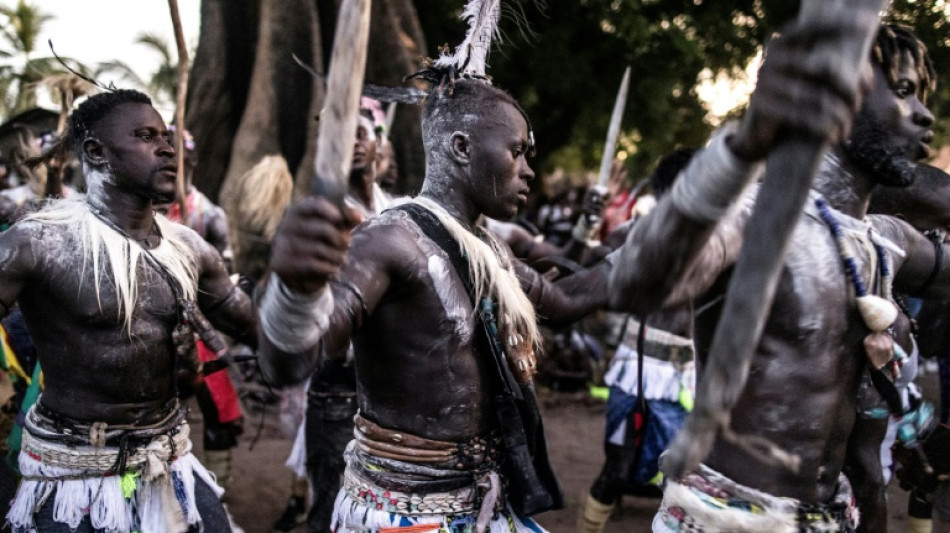
-
 Japan's Takaichi set to call February snap election: media
Japan's Takaichi set to call February snap election: media
-
Scientist wins 'Environment Nobel' for shedding light on hidden fungal networks
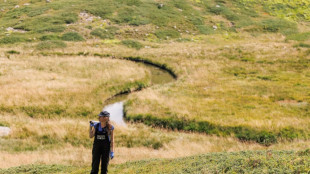
-
 From bricklayer to record-breaker: Brentford's Thiago eyes World Cup berth
From bricklayer to record-breaker: Brentford's Thiago eyes World Cup berth
-
Keys overcomes serve demons to win latest Australian Open warm-up

-
 As world burns, India's Amitav Ghosh writes for the future
As world burns, India's Amitav Ghosh writes for the future
-
Actor Kiefer Sutherland arrested for assaulting ride-share driver

-
 Gilgeous-Alexander shines as Thunder halt Spurs losing streak
Gilgeous-Alexander shines as Thunder halt Spurs losing streak
-
West Bank Bedouin community driven out by Israeli settler violence
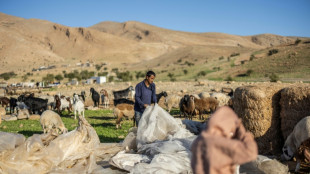
-
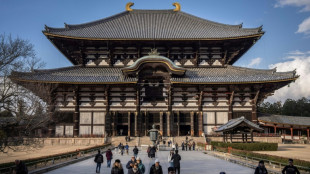 Asian markets mixed, Tokyo up on election speculation
Asian markets mixed, Tokyo up on election speculation
-
US official says Venezuela freeing Americans in 'important step'
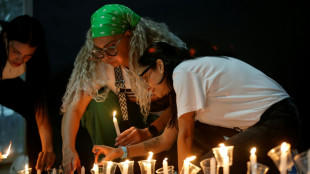
-
 2025 was third hottest year on record: EU, US experts
2025 was third hottest year on record: EU, US experts
-
Japan, South Korea leaders drum up viral moment with K-pop jam

-
 LA28 organizers promise 'affordable' Olympics tickets
LA28 organizers promise 'affordable' Olympics tickets
-
K-pop heartthrobs BTS to kick off world tour in April

-
 Danish foreign minister heads to White House for high-stakes Greenland talks
Danish foreign minister heads to White House for high-stakes Greenland talks
-
US allows Nvidia to send advanced AI chips to China with restrictions

-
 Sinner in way as Alcaraz targets career Grand Slam in Australia
Sinner in way as Alcaraz targets career Grand Slam in Australia
-
Rahm, Dechambeau, Smith snub PGA Tour offer to stay with LIV

-
 K-pop heartthrobs BTS to begin world tour from April
K-pop heartthrobs BTS to begin world tour from April
-
Boeing annual orders top Airbus for first time since 2018

-
 US to take three-quarter stake in Armenia corridor
US to take three-quarter stake in Armenia corridor
-
Semenyo an instant hit as Man City close on League Cup final

-
 Trump warns of 'very strong action' if Iran hangs protesters
Trump warns of 'very strong action' if Iran hangs protesters
-
Marseille put nine past sixth-tier Bayeux in French Cup

-
 US stocks retreat from records as oil prices jump
US stocks retreat from records as oil prices jump
-
Dortmund outclass Bremen to tighten grip on second spot

-
 Shiffrin reasserts slalom domination ahead of Olympics with Flachau win
Shiffrin reasserts slalom domination ahead of Olympics with Flachau win
-
Fear vies with sorrow at funeral for Venezuelan political prisoner

-
 Pittsburgh Steelers coach Tomlin resigns after 19 years: club
Pittsburgh Steelers coach Tomlin resigns after 19 years: club
-
Russell eager to face Scotland team-mates when Bath play Edinburgh

-
 Undav scores again as Stuttgart sink Frankfurt to go third
Undav scores again as Stuttgart sink Frankfurt to go third
-
Fuming French farmers camp out in Paris despite government pledges

-
 Man Utd appoint Carrick as manager to end of the season
Man Utd appoint Carrick as manager to end of the season
-
Russia strikes power plant, kills four in Ukraine barrage

-
 France's Le Pen says had 'no sense' of any offence as appeal trial opens
France's Le Pen says had 'no sense' of any offence as appeal trial opens
-
JPMorgan Chase reports mixed results as Dimon defends Fed chief

-
 Vingegaard targets first Giro while thirsting for third Tour title
Vingegaard targets first Giro while thirsting for third Tour title
-
US pushes forward trade enclave over Armenia

-
 Alpine release reserve driver Doohan ahead of F1 season
Alpine release reserve driver Doohan ahead of F1 season
-
Toulouse's Ntamack out of crunch Champions Cup match against Sale

-
 US takes aim at Muslim Brotherhood in Arab world
US takes aim at Muslim Brotherhood in Arab world
-
Gloucester sign Springbok World Cup-winner Kleyn

-
 Trump tells Iranians 'help on its way' as crackdown toll soars
Trump tells Iranians 'help on its way' as crackdown toll soars
-
Iran threatens death penalty for 'rioters' as concern grows for protester

-
 US ends protection for Somalis amid escalating migrant crackdown
US ends protection for Somalis amid escalating migrant crackdown
-
Oil prices surge following Trump's Iran tariff threat

-
 Fashion student, bodybuilder, footballer: the victims of Iran's crackdown
Fashion student, bodybuilder, footballer: the victims of Iran's crackdown
-
Trump tells Iranians to 'keep protesting', says 'help on its way'

-
 Italian Olympians 'insulted' by torch relay snub
Italian Olympians 'insulted' by torch relay snub
-
Davos braces for Trump's 'America First' onslaught


In Senegal, ancient male rite collides with modern times
The dancers are a blaze of colour, swirling amid a deafening, pounding noise.
In their midst, a young man stands up.
Wearing a beaded necklace and clad in a tight red shirt with multi-coloured scarves hanging from his waist, with his arms outstretched, he makes a long cry to the heavens.
This is an important moment for Cedric Djikila Diatta, 21, on his path towards the coveted status of manhood.
According to the traditions of the Diola people in Senegal's southern region of Casamance, he has entered the period of "Youth" -- the intermediate chapter between adolescence and adulthood.
To prepare for the next step, a phase that may take half a dozen years, he and other young men of the same age have spent the past month together.
They have been working in the rice fields and listening to the elders recount secret rites of passage and inculcate the values of hospitality and discipline.
"Once you have been initiated, you change status," said Cedric.
"You are free to travel, get married, take decisions that affect the entire community."
- Combat -
Central to the transition to adulthood is the notion of warriorhood -- "Life is a fight," said Cedric. "You always have to fight."
And this where the dance comes in: it is designed to strengthen them spiritually for combat, which in the Diola culture is conveyed through wrestling, Senegal's national sport.
As tomtoms and the bombolong, a traditional elongated drum, echo around the village of Kabrousse, the young initiates leap from side to side, their metal armbands rubbing against each other.
Some are bare-chested, others are wearing tunics, feathers or magic charms called grigris -- those men who are due to marry in the coming year are dressed as women.
The dancers swirl around, some brandishing swords or staves, and even fake snakes.
Evening starts to fall and a gentle light, filtered by the emerald fronds of two giant kapok trees, bathes the dancers.
Young women arrive, gathering around the young men, swinging their hips, their makeup and hair perfect, crooning their support for their champions and rubbing powder on the sculpted male bodies.
Children are there, and the elderly too. The mothers look adoringly at their sons on the brink of manhood -- "he's so handsome!" cries Cedric's mother, Angele Antessey Diatta, a proud smile illuminating her face.
- Threatened tradition -
The party marking the end of these important rites coincides with the end of the rainy season each year in late September.
Lower Casamance is part of Senegal's southernmost region, and almost separated from the rest of the country by the tiny state of Gambia.
The rituals, teaching and secrets conveyed from generation to generation vary from village to village, said Abdou Ndukur Kacc Ndao, an anthropologist.
"But these practices are under threat today," he said.
"In a hundred, two hundred years, it may well be that they no longer exist."
Pressures on animist-rooted traditions range from the growing place of Islam in Senegal, greater mixing among ethnic groups, and migration towards other regions within the country or abroad.
Those who return bring back different perspectives, fashions and tastes.
Cedric praised the ancient traditions, but he also had his eye on distant horizons.
He showed off his small house, which had no furniture, toilet or running water or even a floor.
He stopped school at the age of 12 to help his parents in the field. His father fell ill and two of his brothers also died of sickness, lacking treatment.
He trained as a cook, working in one of the hotels in Casamance's Cap Skirring tourist resort, leaving for work at 4:30 am and returning in the afternoon to work in the rice fields.
He said he earned 80,000 CFA (around $120) a month.
His dream was to get a job at the Club Med, an upmarket French vacation village at Cap Skirring.
"When you get hired there, you make contacts enabling you to head off and live elsewhere," he said.
Q.Bulbul--SF-PST




